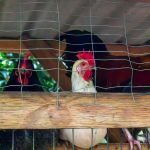When it comes to choosing the right breed of chicken for egg production, there are several factors to consider. First and foremost, you’ll want to consider the climate and environment in which you live. Some breeds of chickens are better suited to cold climates, while others thrive in warmer temperatures. Additionally, you’ll want to consider the size of the eggs you’re looking for. Some breeds are known for producing larger eggs, while others are better known for their consistent egg-laying abilities. It’s also important to consider the temperament of the breed, as some chickens are more docile and easy to handle, while others can be more aggressive. Some popular breeds for egg production include the Rhode Island Red, Leghorn, and Plymouth Rock. Each of these breeds has its own unique characteristics and qualities that make them well-suited for egg production.
Another important factor to consider when choosing a breed of chicken for egg production is the amount of space you have available. Some breeds are better suited to free-range environments, while others do well in smaller, confined spaces. Additionally, you’ll want to consider the amount of time and effort you’re willing to put into caring for your chickens. Some breeds require more attention and maintenance than others, so it’s important to choose a breed that fits your lifestyle and level of commitment. Ultimately, the right breed of chicken for egg production will depend on your specific needs and preferences, so it’s important to do your research and consider all of these factors before making a decision.
Table of Contents
- 1 Setting Up the Perfect Chicken Coop for Egg-laying Hens
- 2 Feeding and Nutrition for Healthy, Productive Chickens
- 3 Understanding Egg-laying Cycles and How to Maximize Egg Production
- 4 Health and Wellness Care for Happy, Healthy Hens
- 5 Collecting, Cleaning, and Storing Fresh Eggs
- 6 Troubleshooting Common Issues with Egg Production and Chicken Care
Setting Up the Perfect Chicken Coop for Egg-laying Hens
Setting up the perfect chicken coop for egg-laying hens is essential for ensuring their health and productivity. The first step in creating a suitable coop is to consider the size and layout of the space. Chickens need plenty of room to move around and stretch their wings, so it’s important to provide them with ample space. Additionally, the coop should be well-ventilated and provide protection from predators and the elements. It’s also important to consider the nesting boxes and roosting areas within the coop. Nesting boxes should be comfortable and private, as hens prefer to lay their eggs in a quiet, secluded space. Roosting areas should be elevated off the ground and provide enough space for each hen to perch comfortably.
In addition to the physical layout of the coop, it’s important to consider the materials used in its construction. The coop should be made from durable, weather-resistant materials that are easy to clean and maintain. Additionally, it’s important to provide plenty of bedding and nesting material to keep the coop clean and comfortable for the hens. Finally, it’s important to consider the location of the coop within your property. The coop should be situated in an area that receives plenty of sunlight and is well-drained to prevent flooding. By taking all of these factors into consideration, you can create the perfect chicken coop for your egg-laying hens.
Feeding and Nutrition for Healthy, Productive Chickens
Feeding and nutrition are crucial aspects of caring for egg-laying hens. A well-balanced diet is essential for ensuring that hens are healthy and productive. The foundation of a hen’s diet should be a high-quality commercial feed that is specifically formulated for laying hens. This feed should contain a balanced mix of protein, carbohydrates, vitamins, and minerals to support egg production and overall health. In addition to commercial feed, hens should also have access to fresh water at all times. Water is essential for digestion, egg production, and overall health, so it’s important to ensure that hens have access to clean, fresh water throughout the day.
In addition to commercial feed and water, hens can also benefit from supplemental treats and snacks. Fruits, vegetables, and grains can provide additional nutrients and variety to their diet. However, it’s important to avoid feeding hens foods that are high in salt, sugar, or fat, as these can be harmful to their health. It’s also important to monitor the amount of treats given to hens, as overfeeding can lead to obesity and health issues. Finally, it’s important to consider the timing of feeding. Hens should be fed at regular intervals throughout the day to ensure that they have enough energy for egg production. By providing a well-balanced diet and proper nutrition, you can ensure that your hens are healthy and productive.
Understanding Egg-laying Cycles and How to Maximize Egg Production
Understanding the egg-laying cycles of hens is essential for maximizing egg production. Hens typically begin laying eggs around 18-20 weeks of age and will continue laying eggs for several years. The frequency of egg-laying can vary depending on factors such as breed, age, diet, and environmental conditions. In general, most hens will lay one egg every 24-26 hours, with peak production occurring in the first year of laying. After the first year, egg production may decline slightly, but hens can continue laying eggs for several years with proper care and management.
To maximize egg production, it’s important to create an environment that is conducive to laying eggs. This includes providing a comfortable and secure nesting area with plenty of bedding material. Additionally, it’s important to ensure that hens have access to a well-balanced diet and fresh water at all times. It’s also important to monitor the health and wellness of hens regularly, as illness or stress can impact egg production. Finally, it’s important to collect eggs regularly to prevent hens from going broody or developing other behavioral issues that can impact egg production. By understanding the egg-laying cycles of hens and providing a suitable environment and care, you can maximize egg production and ensure that your hens are healthy and productive.
Health and Wellness Care for Happy, Healthy Hens
Health and wellness care is essential for ensuring that hens are happy, healthy, and productive. Regular health checks are important for monitoring the overall well-being of hens and identifying any potential issues early on. This includes checking for signs of illness or injury, monitoring weight and body condition, and observing behavior and activity levels. Additionally, it’s important to provide regular preventative care such as vaccinations and parasite control to protect hens from common diseases and pests.
In addition to regular health checks, it’s important to provide a clean and comfortable living environment for hens. This includes keeping the coop clean and well-maintained, providing plenty of bedding material, and ensuring that hens have access to fresh water at all times. It’s also important to provide opportunities for exercise and mental stimulation by allowing hens to free-range or providing enrichment activities within the coop. Finally, it’s important to monitor the social dynamics within the flock to ensure that hens are getting along well with each other. By providing regular health checks, preventative care, a clean living environment, and opportunities for exercise and mental stimulation, you can ensure that your hens are happy, healthy, and productive.
Collecting, Cleaning, and Storing Fresh Eggs
Collecting, cleaning, and storing fresh eggs is an important aspect of caring for egg-laying hens. When collecting eggs from the nesting boxes, it’s important to handle them gently to prevent cracking or breaking. It’s also important to collect eggs regularly throughout the day to prevent them from becoming dirty or damaged. Once collected, eggs should be cleaned using a gentle abrasive such as sandpaper or a brush to remove any dirt or debris. It’s important not to wash eggs with water unless absolutely necessary, as this can remove the natural protective coating on the shell.
After cleaning, eggs should be stored in a cool, dry place away from strong odors or contaminants. It’s best to store eggs in their original carton with the pointed end facing down to help maintain freshness. Eggs should be consumed within 3-4 weeks for optimal quality and flavor. It’s also important to regularly check eggs for signs of spoilage such as an off odor or unusual appearance. By following these guidelines for collecting, cleaning, and storing fresh eggs, you can ensure that your eggs are safe, fresh, and delicious.
Troubleshooting Common Issues with Egg Production and Chicken Care
Despite your best efforts in caring for your egg-laying hens, there may be times when issues arise that impact egg production or overall chicken care. One common issue that can affect egg production is stress or illness within the flock. This can be caused by factors such as overcrowding, poor nutrition, or exposure to predators. It’s important to monitor the behavior and activity levels of hens regularly to identify any signs of stress or illness early on.
Another common issue with egg production is broodiness in hens. Broodiness occurs when a hen becomes overly protective of her eggs and may refuse to leave the nesting box or stop laying altogether. To address broodiness in hens, it’s important to provide a comfortable nesting area with plenty of bedding material and collect eggs regularly to prevent them from becoming broody.
In addition to these common issues with egg production, there may also be other health or behavioral issues that arise within the flock. It’s important to address these issues promptly by seeking advice from a veterinarian or experienced poultry keeper. By troubleshooting common issues with egg production and chicken care early on, you can ensure that your hens remain healthy and productive.
In conclusion, caring for egg-laying hens requires careful consideration of factors such as breed selection, coop setup, feeding and nutrition, understanding egg-laying cycles, health and wellness care, collecting/cleaning/storing fresh eggs, as well as troubleshooting common issues with egg production and chicken care. By taking these factors into consideration and providing proper care and management for your hens, you can ensure that they remain healthy, happy, and productive throughout their lives.
Meet Walter, the feathered-friend fanatic of Florida! Nestled in the sunshine state, Walter struts through life with his feathered companions, clucking his way to happiness. With a coop that’s fancier than a five-star hotel, he’s the Don Juan of the chicken world. When he’s not teaching his hens to do the cha-cha, you’ll find him in a heated debate with his prized rooster, Sir Clucks-a-Lot. Walter’s poultry passion is no yolk; he’s the sunny-side-up guy you never knew you needed in your flock of friends!







